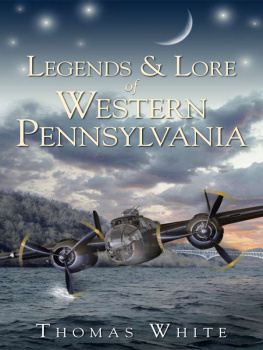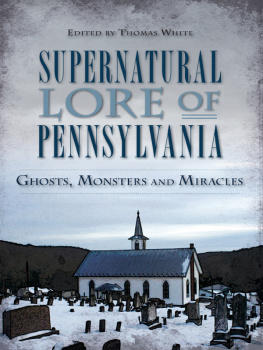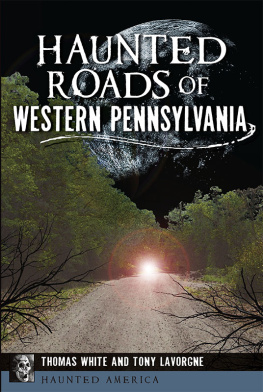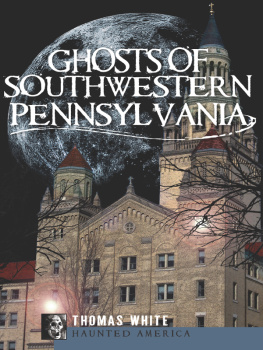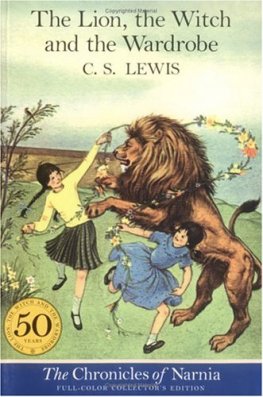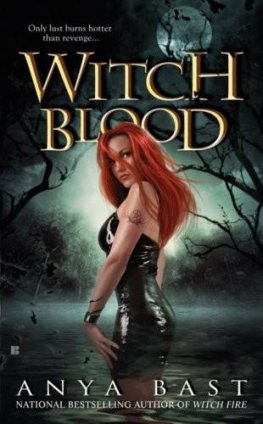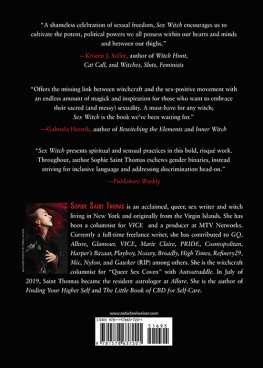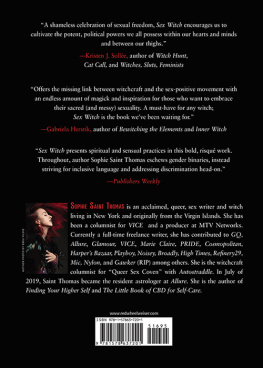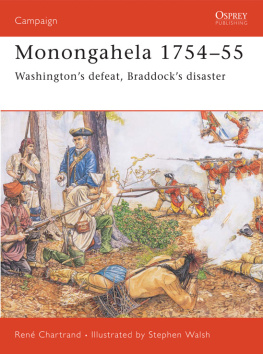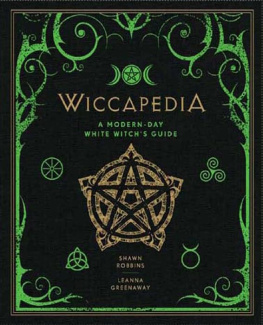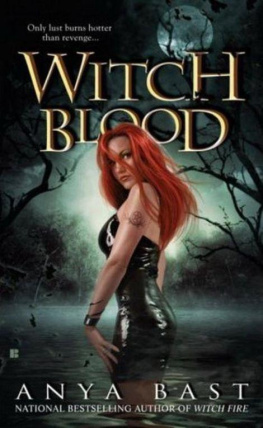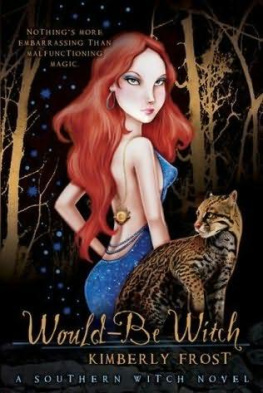Published by The History Press
Charleston, SC
www.historypress.com
Copyright 2020 by Thomas White
All rights reserved
First published 2020
e-book edition 2020
ISBN 978.1.43967.129.0
Library of Congress Control Number: 2020938623
print edition ISBN 978.1.46714.515.2
Notice: The information in this book is true and complete to the best of our knowledge. It is offered without guarantee on the part of the author or The History Press. The author and The History Press disclaim all liability in connection with the use of this book.
All rights reserved. No part of this book may be reproduced or transmitted in any form whatsoever without prior written permission from the publisher except in the case of brief quotations embodied in critical articles and reviews.
ACKNOWLEDGEMENTS
Researching and writing this book required the help and support of many people. I want to thank my wife, Justina, and my children, Tom (who provided some illustrations) and Marisa, for their support and encouragement, as well as my brother Ed and my father, Tom. My mother, Jean, who passed away in 2011, instilled a curiosity in me at a young age about history and the unexplained and will always influence any project that I work on. Megan DeFries, Gerry ONeil, Anas Grateau, Gina DelGreco Hertrick, Elisa Astorino, Kathleen Kenna, Fahmida Hossain and Elizabeth Williams all spent time proofreading and editing for me, and their input and suggestions are greatly appreciated. Maria Sholtis and Joan Peake from the Pennsylvania Room at the Uniontown Public Library and Marquel Sherry at the Indiana University of Pennsylvania Special Collections and Archives opened up their collections for me and provided important information. Author Sylvia Shults graciously provided information about Moll Derrys descendants and the tragic case of Rhoda Derry. I would also like to thank Lindsay Davenport, Brianna Brown, Michelle (Bertoni) McAndrew, Dr. Edward Brett, Dr. Joshua Forrest, Dr. Sara Baron, Tracie Ballock, Paula Toncheff, Kurt Wilson, Andy Grejda, Ryan Hughes, Vince Grubb, Brian McKee, Michael and Cassandra Witherel, Maggie Cervone and the staff of Coffee Buddha, who all helped in some way. In addition, this book would not have been possible without the work of the late George Swetnam, who dedicated many years to chronicling the regions unusual history.
INTRODUCTION
In the decades following the American Revolution, stories were told in the ancient hills and misty hollows of Fayette County, Pennsylvania, of a woman with mysterious powers. Rumors of magic surrounded her, and some locals believed that she could see into the future. As her reputation spread, desperate people came to the woman for healing and protection when they were ill or believed themselves to be cursed. Some were convinced that she could help find missing money, animals and belongings through her strange rituals. A few people even insisted that she could fly by some supernatural means. It was said that the strange woman slept in a large cradle with rockers that were aligned lengthwise, and by rocking herself she could launch into the air.
Moll Derry was her name, or at least that is what everyone called her. Her real name was Mary Derry (Moll is a diminutive form of Mary), and she lived in rural Georges Township near the small town of Haydentown, just south of the county seat of Uniontown. Derrys reputation was more ominous than that of a simple healer, however. Even though she was frequently helpful to those who came to her in need, Derry was not one to be angered or crossed. Local farmers who ended up on her bad side found that their cows would not produce milk and their bread would not rise. Her true enemies regretted being on the receiving end of her powers, and more than once, they ended up dead. It is not hard to imagine why, under such circumstances, Derry was associated with witchcraft. Over time, the enigmatic woman would come to be known as the Witch of the Monongahela because of her relative proximity to the important waterway. Others called her the Witch of the Little World, which was a nickname for her corner of the state. Her story would live on in Fayette County and the rest of southwestern Pennsylvania long after her death.
Witchcraft is not a subject that is usually associated with western Pennsylvania. Historians of the region, both professional and amateur, have traditionally focused on topics such as industrialization, labor, immigration, ethnicity and religion or events such as the French and Indian War and the Whiskey Rebellion. In America, historical witchcraft (as opposed to modern Neopagan practices) is more commonly linked with Salem and early colonial New England in the popular imagination. Yet states such as Pennsylvania, Maryland and West Virginia have far more accounts of witchcraft than Massachusetts. The primary difference is that the colonies/states south of New England did not execute witches, and therefore accounts attracted considerably less national attention. Pennsylvanias history is saturated with little-known accounts of folk magic and witchcraft. Virtually every county has at least one tale, and some have dozens. While researching my book Witches of Pennsylvania: Occult History and Lorewhich is a brief survey of the history of witchcraft in the stateI was genuinely surprised at just how extensive the belief in witchcraft was and, in some cases, still is.
Since I am a native of the Pittsburgh region, I have always found the accounts of witches in the western part of the state interesting. I circled around the legend of Mary Moll Derry several times over the past twenty years while researching and writing about Pennsylvanias supernatural folklore. With each pass, I dug a little deeper into her story. The first accounts that I read were written in the mid-twentieth century by the prolific local writer/journalist/historian/folklorist George Swetnam. There was never any doubt that Old Moll, as she was sometimes called, was a real flesh-and-blood woman. Her name and versions of her story appeared in various local history books, some dating back to a time when she existed in the living memory of the inhabitants of southern Fayette County. By all accounts, she lived for a long time, arriving in the county in the late 1700s and surviving far into the 1800scertainly long enough to create a lasting influence in the lore of the region. As I delved further into the tales, I realized that even though there was some consistency in the accounts, much remained a mystery. Finally, I decided to attempt to compile everything that I had learned about Derry in one book. This volume is part biography, part an exploration of legends and part an examination of folk magic traditions. While there will always be a substantial amount of information that we will never know about Moll Derry, I will examine what we do know about her, her life and her legacy.
Derry has proven to be a complicated figure to assess. Though she has long been called a witch and was feared by many, most of the legends told about her also directly show or infer some level of respect. Historically, witches were often outsiders or people pushed to the fringes of society. They were viewed as dangerous individuals who tampered with unearthly forces and threatened social order. Derry, however, is often portrayed as a sort of dark hero in the legends. She curses murderers and thugs, finds lost items and warns a young woman of impending danger. These actions are more in line with her less ominous nickname Fortune Teller of the Revolution. Still, there were those who assumed that her powers, whether used to heal, curse or see the future, had come from a pact with the devil.





